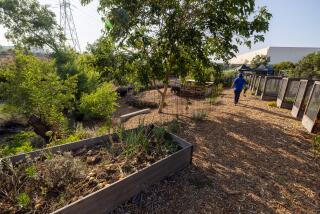Countywide : Grants Are Used to Blend Science Classes
- Share via
Teaching science has taken a new tack this year for teachers at four Ventura County high schools.
Hueneme, Westlake, Rio Mesa and Simi Valley high schools have received National Science Foundation grants, averaging $9,000 per school, to allow teachers to teach science subjects together, rather than in separate courses.
Chemistry, physics, biology and earth science will be blended in courses that begin in seventh grade, giving students a chance to study subjects that have been reserved for high school.
“We want to get all students involved in science, and to give them a thorough science education, which has not been happening,” said chemistry teacher Helen Kota, chairwoman of Westlake’s science department.
“We’ve been taking care of honors students and bright students, but we have not been taking care of the whole population very well.”
Westlake students will spend at least 40% of their science course time in the laboratory or doing hands-on experiments this year, Kota said.
The four Ventura County schools were among 110 schools statewide that received the grants last spring. The money pays for substitute teachers so science teachers can work together on a curriculum that encourages incorporating the sciences and emphasizes the use of technology, said Zack Taylor, a consultant with the state Department of Education.
This week, foundation officials in Washington announced the second phase of the program, $8.6 million in grants to be distributed to schools in five states. California will receive about $1.5 million of that money, which state officials will use to designate 10 schools statewide to serve as regional headquarters for science education.
Those schools, to be selected in December, will serve as science hubs, where university professors may conduct seminars and new science teachers are trained, Zack Taylor said.
Hueneme Principal Terry Taylor praised the new approach, saying it goes beyond encouraging students to become scientists.
“We want to stress science literacy, so all students can understand these issues as they come up in the media, voting measures and other areas,” Terry Taylor said.
More to Read
Sign up for Essential California
The most important California stories and recommendations in your inbox every morning.
You may occasionally receive promotional content from the Los Angeles Times.













